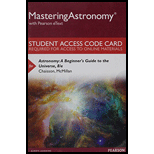
Concept explainers
To distinguish among the various type of spiral galaxies.
Answer to Problem 1RD
Spiral galaxies are of three types, Sa, Sb, and Sc. Sa galaxies have large nuclear bulges, and tight arms, Sb galaxies has less tightly wound arm, and small bulges, finally Sc have the smallest bulges and least tightly wound arms.
Explanation of Solution
Galaxies are mainly categorised into four, spiral, barred spirals, elliptical, and irregular, on the basis of their visual appearance. In which spiral galaxies are again divided into three, Sa, Sb, and Sc. Mainly the spiral galaxies have flattened galactic disk with spiral arms, central bulge, dense nucleus, old stars, and an extended halo of faint.
Spiral galaxy is usually denoted using letter S. The first type is Sa, which have the largest nuclear bulge, and Sc has the smallest bulge. The tightness of the spiral arm is depends on the size of the bulge, hence type Sa has tightly wound arms, and Sc has less tightly wound arms, Sb stands in between, in case of bulges and tightness of arms.
The size of the arms of Sa galaxies are almost circular, Sb has open spiral arms, and Sc have loose poorly defines spiral arms. Along with these three there are barred spiral galaxies, which differ from spiral galaxy due to the presence of elongated bar passing through the centre and extending beyond the nuclear bulge into the disk.
Conclusion:
Therefore, the Spiral galaxies are of three types, Sa, Sb, and Sc. Sa galaxies have large nuclear bulges, and tight arms, Sb galaxies has less tightly wound arm, and small bulges, finally Sc have the smallest bulges and least tightly wound arms.
Want to see more full solutions like this?
Chapter 15 Solutions
Mastering Astronomy with Pearson eText -- Standalone Access Card -- for Astronomy: A Beginner's Guide to the Universe (8th Edition)
 College PhysicsPhysicsISBN:9781305952300Author:Raymond A. Serway, Chris VuillePublisher:Cengage Learning
College PhysicsPhysicsISBN:9781305952300Author:Raymond A. Serway, Chris VuillePublisher:Cengage Learning University Physics (14th Edition)PhysicsISBN:9780133969290Author:Hugh D. Young, Roger A. FreedmanPublisher:PEARSON
University Physics (14th Edition)PhysicsISBN:9780133969290Author:Hugh D. Young, Roger A. FreedmanPublisher:PEARSON Introduction To Quantum MechanicsPhysicsISBN:9781107189638Author:Griffiths, David J., Schroeter, Darrell F.Publisher:Cambridge University Press
Introduction To Quantum MechanicsPhysicsISBN:9781107189638Author:Griffiths, David J., Schroeter, Darrell F.Publisher:Cambridge University Press Physics for Scientists and EngineersPhysicsISBN:9781337553278Author:Raymond A. Serway, John W. JewettPublisher:Cengage Learning
Physics for Scientists and EngineersPhysicsISBN:9781337553278Author:Raymond A. Serway, John W. JewettPublisher:Cengage Learning Lecture- Tutorials for Introductory AstronomyPhysicsISBN:9780321820464Author:Edward E. Prather, Tim P. Slater, Jeff P. Adams, Gina BrissendenPublisher:Addison-Wesley
Lecture- Tutorials for Introductory AstronomyPhysicsISBN:9780321820464Author:Edward E. Prather, Tim P. Slater, Jeff P. Adams, Gina BrissendenPublisher:Addison-Wesley College Physics: A Strategic Approach (4th Editio...PhysicsISBN:9780134609034Author:Randall D. Knight (Professor Emeritus), Brian Jones, Stuart FieldPublisher:PEARSON
College Physics: A Strategic Approach (4th Editio...PhysicsISBN:9780134609034Author:Randall D. Knight (Professor Emeritus), Brian Jones, Stuart FieldPublisher:PEARSON





